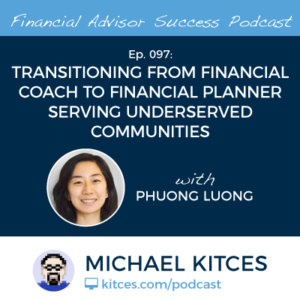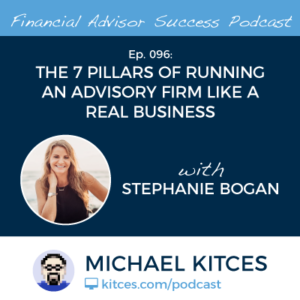Notwithstanding their commission-based roots as a product distribution intermediary, this year's Financial Planning magazine survey of the top 50 independent broker-dealers showed that in the past year they generated more revenue from fees than from commissions. Yet even as broker-dealers transition from their commission-based roots to the fee-based model and provide more and more advice, the challenge remains that when historically broker-dealers went out of their way to not provide advice (to avoid the RIA registration requirements and advice liability that may result), too many broker-dealers still treat the growing volume of advice from their advisors as a liability to control and minimize, rather than a value-add to enhance... which will make it increasingly difficult for them to compete, even as they transition to the fee-based model.
In this week’s #OfficeHours with @MichaelKitces, my Tuesday 1 PM EST broadcast via Periscope, we explore the roots of why broker-dealers historically have tried to prevent their representatives from providing advice, the ways that broker-dealers have tried to limit the scope of their representatives giving advice (from centralized planning departments to tech-delivered financial plans), and why the future of broker-dealers managing the liability exposure of providing advice is not about limiting the ability of their representatives to give advice but rather about investing in the training and education of their advisors to ensure they have the knowledge to give the right in the first place!
The trend of broker-dealers towards fee-based advice has been incredibly strong over the past decade, as the top-50 independent broker-dealers have risen from having fee-based revenue that is just 1/3rd of commissions, to surpassing it in the past year. And the trend appears to only be accelerating, due to both the simple realization that recurring AUM fees is just a much more stable and sustainable (and higher-valuation) business model, and the emerging trend of both US-based and global fiduciary regulation that threatens to curtail commission-based compensation and its conflicts of interest anyway.
The caveat, however, is that too many broker-dealers still don't treat advice itself as a valuable service to amplify, but instead manage it as a liability exposure to be minimize. In order to mitigate that risk, some broker-dealers have created centralized planning departments, which often aren't just about leveraging advisor efficiency, but instead are built to produce standardized “financial plans in a box” with formulaic advice that the “advisor” then (just like a pre-packaged product that they’d sell) “presents” to the client customer (removing the actual advisor from the advice equation!). And more are now looking to adopt technology that can further "standardize" the advice their advisors provide, eliminating the ability of the advisors to actually create more value-add with client-specific advice!
Which means broker-dealers risk unwittingly amplifying the breakaway broker trend to RIAs, even as they adopt their own fee-based models, not because their advisors want to transition to fee-based advice, but simply because their advisors want the freedom to actually give advice, customized to their individual clients. Especially as competition increasingly pressures advisors to move towards niches and specializations beyond mere "cookie-cutter" comprehensive financial plans.
Ultimately, though, the key point is simply to recognize that for firms that actually want to build value in an advice-centric future, advice should be treated as a value-add, rather than a liability. Which means the path to minimizing liability exposure is not to limit the ability of advisors to give advice, but to invest into their training and education with CFP certification and advanced post-CFP designations to ensure that they give the right advice in the first place, and form specializations (from student loan planning to retirement distribution planning) that further enhances their domain expertise and thereby reduces the risk of giving the "wrong" advice that creates liability for the firm!

 Welcome back to the 97th episode of the Financial Advisor Success podcast!
Welcome back to the 97th episode of the Financial Advisor Success podcast! Welcome back to the 96th episode of the Financial Advisor Success podcast!
Welcome back to the 96th episode of the Financial Advisor Success podcast!
